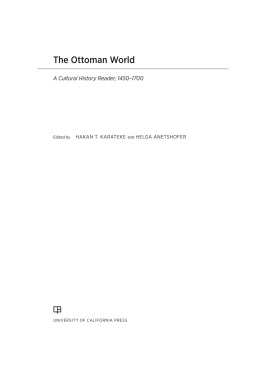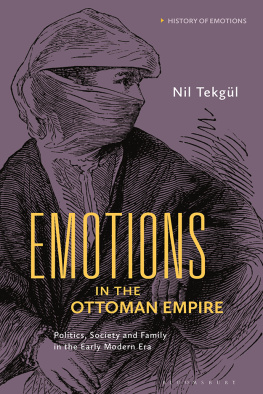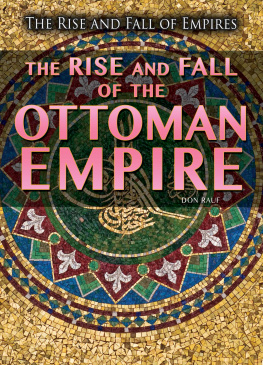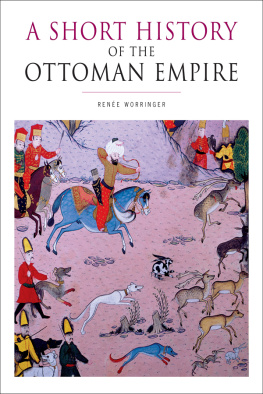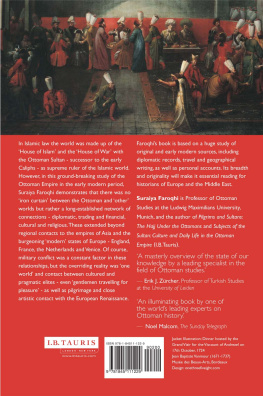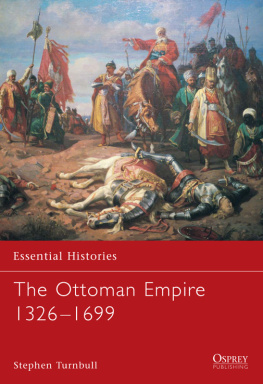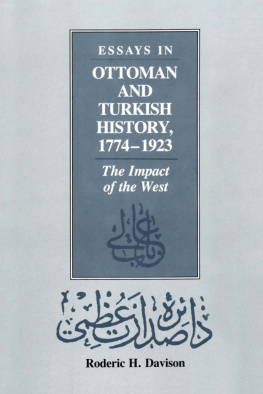The Ottoman World
A Cultural History Reader, 14501700
Edited by HAKAN T. KARATEKE and HELGA ANETSHOFER

UNIVERSITY OF CALIFORNIA PRESS
University of California Press
Oakland, California
2021 by The Regents of the University of California
Library of Congress Cataloging-in-Publication Data
Names: Karateke, Hakan T., editor. | Anetshofer, Helga, editor.
Title: The Ottoman world : a cultural history reader, 14501700 / edited by Hakan T. Karateke and Helga Anetshofer.
Description: Oakland, California : University of California Press, [2021] | Includes index.
Identifiers: LCCN 2021004318 (print) | LCCN 2021004319 (ebook) | ISBN 9780520303430 (hardback) | ISBN 9780520303454 (paperback) | ISBN 9780520972711 (ebook)
Subjects: LCSH : TurkeyHistoryOttoman Empire, 12881918Sources. | TurkeyHistoryOttoman Empire, 12881918Early works to 1800.
Classification: LCC DR 485 . O 885 2021 (print) | LCC DR 485 (ebook) | DDC 956/.015dc23
LC record available at https://lccn.loc.gov/2021004318
LC ebook record available at https://lccn.loc.gov/2021004319
Manufactured in the United States of America
25 24 23 22 21
10 9 8 7 6 5 4 3 2 1
To Cemal Kafadar, who has inspirationally explored the uncharted territories of the Ottoman cultural world
CONTENTS
ILLUSTRATIONS
ACKNOWLEDGMENTS
We extend our profound gratitude to the contributors of this volume for their hard work and their patience with our badgering emails asking them to rework translations. We hope they feel that their efforts were worth the trouble.
Ali Emre zyldrm, who possesses a penetrating understanding of Ottoman poetry and prose, was always prepared to brainstorm with us as we parsed obscure allusions in the texts, and we gladly acknowledge his insightful explanations. We also benefited from the linguistic expertise of Dzovinar Derderian for Armenian and Tahera Qutbuddin for Arabic. Amir Toft and smail Ernsal generously shared their expertise of the legal language used in court records with us. Mendy Chitrik provided us with his perspective on some of the texts in rabbinical Hebrew. We are grateful to them.
We have consulted many colleagues along the way and have sought their suggestions for possible texts to include in the readeran extremely enriching experience for us. We included many recommended texts; others, owing to space and format, had to be left out. We appreciate the encouragement we received from Edith G. Ambros, Abdurrahman Atl, Hatice Aynur, Orit Bashkin, Yaron Ben-Naeh, Cornell Fleischer, Barbara Kellner-Heinkele, Vjeran Kursar, Erturul ktem, Claudia Rmer, Zeynep Tezer, Dror Zeevi, and we appreciate their willingness to guide and help us. Our thanks also go to Ali Yaycolu who kindly allowed us to use one of his wonderful paintings on the cover of this volume.
Some readers will note that almost all the court record entries in this volume have been translated from previously published volumes or theses. We did not venture into the archives in search of unpublished cases for our project, as this would have been far too time-consuming. However, we did view the originals of all documents translated here, and indeed sometimes preferred our own readings to published versions. The luxury of gaining access to the originals in such a short period of time would have been unimaginable a decade or so ago, before the digital revolution. We extend our sincere thanks to Melih Kayar, Muzaffer Doan, Betl Kaya, Ahmet Arslantrk, Halil brahim Binici, and Tolga Cora for their assistance in gathering these documents from the archives and manuscript libraries. The Istanbul Court Records project, initially spearheaded by the Center for Islamic Studies (SAM) in Istanbul, was absolutely instrumental for us in bringing together court cases that presented a thematic coherence. (On the flip side, the availability of this documentation inevitably tilted the focus of cases in this volume to Istanbul.)
In the final phases of writing this book we received crucial feedback on the preface and the chapter introductions from our graduate students Katherine Costello and Theo Knights, as well as from Hakan Karatekes undergraduate students in the University of Chicago Study Abroad program in Morocco (2020): Alia Shahzad, Jessica Gitre, Ruth Dworin, Karolina Zachor, Katherine Howell, and Emma Mitnick. Their reactions were so insightful that we felt compelled to reorganize or rewrite certain sections in the chapter introductions. We have been lucky to have such brilliant students candidly share with us how this reader might be perceived by its targeted audience in the classroom. We heartily thank each one of them.
We knew when we first embarked on this project that we would at some point turn to Lydia Kieslingauthor, literary critic, friend, and an old student of oursto have a pair of professional eyes go over the translations. She did not turn us down, and as usual was generous with her time in copyediting many of the chapters to their final versions. Amir Toft was always prepared to edit the legal texts in the reader and search with us for the corresponding phrases in English of Ottoman legal terms. Sooyong Kim kindly read through the stories in the forty-fifth chapter and offered his elegant renderings. We are thankful to all these people.
The idea for a reader on Ottoman history originated with Eric Schmidt at the University of California Press. He approached our dear colleague Dimitri Kastritsis, with whom we sought ways to jointly administer the project. In the end, Dimitri lent us his full support and also contributed a translation to the volume, for which we are thankful. Our sincere thanks are due to Eric for his visit to us in 2017 at the University of Chicago, where he carefully listened to our pitch for a reader with a focus on cultural and social history and found it worthwhile to pursue. We are very grateful for his guidance through this long journey. We also sincerely thank Cindy Fulton and Gabriel Bartlett who very competently helped us during the production of the book and Frat Ciftci for preparing the index.
Finally, we are thankful for the support we received from our home institution, the University of Chicagos Division of the Humanities, the Micro-Metcalf Program in the College and the Joyce Z. and Jacob Greenberg Center for Jewish Studies.
PREFACE
The Ottoman World is planned as a sourcebook with the objective of finding a variety of voices from across Ottoman society and bringing them into twenty-first century classrooms. It includes texts from the 1450s to 1700 and aims to supply instructors with narratives conveying the lived experiences of individualswith attention to both the inner life and the material worldthrough texts that highlight human variety and accelerate a trend away from the state-centric approach to Ottoman history. Where possible, the texts emphasize the life experiences of real human beingstheir hopes and fears, their disputes and ambitions, their prejudices and senses of humor, their social interactions and trajectories. By focusing on the lives that people, both common and uncommon, lived, we hope students will absorb events of the past on an emotional as well as an intellectual level. This approach brings a sense of relevance to historical study, connecting our modern existence with humans from a different place and time, and it provides fertile ground for class discussion. We suspect that students will be eager to shift their attention from the overly emphasized military character attributed to the Ottoman polity to more relatable topics.

